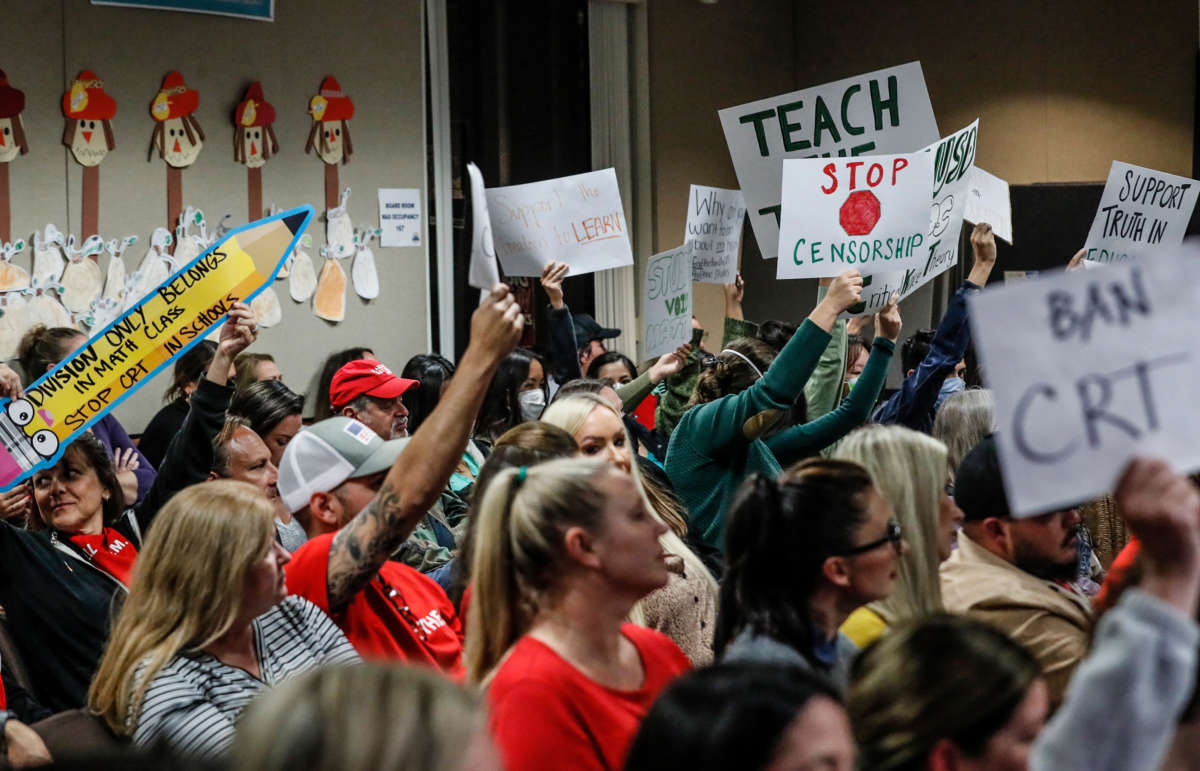Truthout is an indispensable resource for activists, movement leaders and workers everywhere. Please make this work possible with a quick donation.
Just before the November 2 election, in which Trump-endorsed Glenn Youngkin defeated Democrat Terry McAuliffe in the Virginia governor’s race with the help of 57 percent of white women, a right-wing dark money group called Independent Women’s Voice (IWV) spent thousands in ads to promote its new attack website, ToxicSchools.org.
The site features a scandalizing 2016 Washington Post headline: “McAuliffe vetoes bill permitting parents to block sexually explicit books in school.” But what the ad (and the headline) obscured was the actual context of the resolution: The Republican bill was a response to one mother who sought to ban Toni Morrison’s groundbreaking novel Beloved, a story about Black trauma and resilience in the decades following the end of slavery, because of a scene of sexual violence. Strikingly, it would have made Virginia the first state in the country to allow parents to censure such school books.
Much of this story is not new. As Jenn Jackson observes in Teen Vogue: “Current events may be relatively silent on the role of women in white supremacy, but history is quite loud.” The indelible image of white mothers in Little Rock, Arkansas, heckling 15-year-old Elizabeth Eckford, the first of the Little Rock Nine to arrive the day their public high school integrated in 1957, may come to mind. In her historical account of white women’s involvement from the 1920s to the 1970s in efforts to stop school integration, Mothers of Massive Resistance, Elizabeth McRae refers to these white women as the “constant gardeners of segregation.”
But there are differences, too. Today’s “mothers of massive resistance” appear to represent an organic local uprising of “concerned parents,” but the outcry is being stoked by dark money groups like IWV.
Attacks on public school curricula can serve many purposes, including undermining teachers’ unions, promoting school privatization and impacting elections, like Virginia’s. They also conjure outrage among the most racist elements of the Republican base.
Proposed legislation prohibiting discussions of systemic racism (which Republicans are misrepresenting as “critical race theory”) could be far-reaching, potentially banning pedagogically fundamental terms like “anti-racism,” “diversity training,” “patriarchy” and “whiteness” from schools, as one bill that recently passed the Wisconsin legislature did.
The manufactured outrage toward discussions of racism in schools is largely fueled by women-led astroturf groups, such as Parents Defending Education (which has deep ties to the Koch network), Moms for Liberty, No Left Turn in Education, and the Free to Learn Coalition (funded by the Leonard Leo network, who orchestrated the packing of the courts under Trump).
These astroturf groups are a reminder yet again that the white nuclear family is one of the most powerful forces for reproducing white supremacy. Part of the way this works is through hoarding resources, something even some liberal and progressive white women do when they declare their support for policies like school desegregation and then refuse to send their white children to integrated schools. “Tracking,” the designation of separate paths for students based on educational performance, sometimes called “modern-day segregation,” is another way.
So how have right-wing women’s groups, funded by anonymous donors, come to take an oversized role in local school politics as concerned moms?
As historian Nancy MacLean has shown, men like economist James M. Buchanan and billionaire Charles Koch, who funded Buchanan’s center at George Mason University (the impetus for which was Buchanan’s antipathy toward school integration in Virginia), have sought to intentionally hide the political nature of their libertarian-minded organizations for decades.
Dark money organizations spawned by Koch and other billionaires have since spread like a noxious, invasive weed, from the Heritage Foundation to Americans for Prosperity to Charlie Kirk’s Turning Point USA. In recent years, this network has integrated women-led groups that provide a “soft” cover for a deeply political agenda.
But don’t let the fact that there are women out front fool you. The women championing today’s dark-money attacks on public schools serve a regressive political agenda, just as the women who tended the gardens of segregation did almost a century ago.
A terrifying moment. We appeal for your support.
In the last weeks, we have witnessed an authoritarian assault on communities in Minnesota and across the nation.
The need for truthful, grassroots reporting is urgent at this cataclysmic historical moment. Yet, Trump-aligned billionaires and other allies have taken over many legacy media outlets — the culmination of a decades-long campaign to place control of the narrative into the hands of the political right.
We refuse to let Trump’s blatant propaganda machine go unchecked. Untethered to corporate ownership or advertisers, Truthout remains fearless in our reporting and our determination to use journalism as a tool for justice.
But we need your help just to fund our basic expenses. Over 80 percent of Truthout’s funding comes from small individual donations from our community of readers, and over a third of our total budget is supported by recurring monthly donors.
Truthout has launched a fundraiser to add 500 new monthly donors in the next 9 days. Whether you can make a small monthly donation or a larger one-time gift, Truthout only works with your support.
